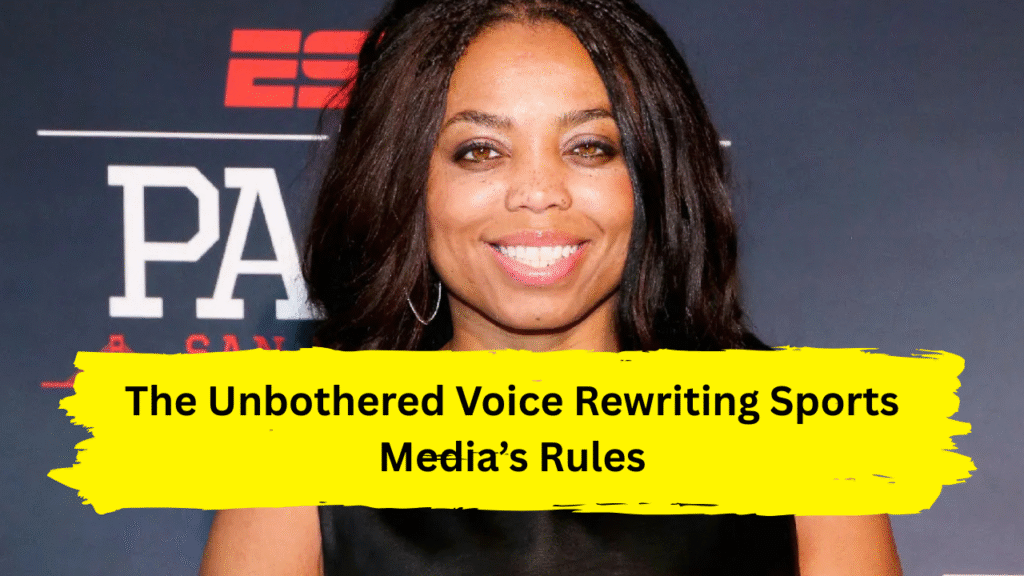Discover why Jemele Hill remains one of media’s most fearless voices. From ESPN controversies to her Emmy-winning work, we explore her impact on sports, politics, and culture. Join the conversation about journalism’s future.
The boxing ring exploded in controversy at the 2024 Paris Olympics when Italian fighter Angela Carini quit mid-match against Algeria’s Imane Khelif after just 46 seconds. As the world debated whether Khelif, previously barred from world championships over gender eligibility concerns, should compete, one voice sliced through the noise. Jemele Hill tweeted: “She quit because she was gonna get her a** whooped” . Fast forward to June 2025: A leaked medical report allegedly confirming Khelif’s male chromosomes has critics demanding Hill apologize. Her response? Radio silence. For those tracking Hill’s two-decade career, this unbothered stance isn’t new—it’s her signature.
The Making of a Media Disruptor
Hill’s journey began far from cable news studios. Raised in Detroit by a single mother battling addiction, she found refuge in newspapers. Cleaning a client’s home with her mother, teenage Jemele devoured sports sections, then front pages. “Reading stoked my curiosity,” she later told the National Press Foundation. “It’s impossible to be a journalist without that” . At Mumford High School (whose fame came from Beverly Hills Cop’s fictionalized tie), she joined the school paper—unaware she’d later joke about having its auditorium named after her instead of alum Jerry Bruckheimer .
A Detroit Free Press apprenticeship at 17 cemented her path. Mentors like Rachel Jones and sportswriter Jeanette Howard showed her the craft’s backbone: “Ask tough questions. Build source relationships. Own your space.” At 1997’s NABJ convention, seeing 3,000 Black journalists shattered her imposter syndrome: “It gave me belief I belonged here” . This foundation steeled her for newsrooms where Black women were anomalies—and for battles that would later make headlines.
When Sports and Politics Collide: The ESPN Crucible
Hill joined ESPN in 2006, but her trajectory shifted in 2017. As co-host of SC6, she called then-President Trump a “white supremacist” on Twitter . The backlash was nuclear. The White House deemed it a “fireable offense.” ESPN suspended her for violating social media policies. Yet Hill refused to recant: “My regret is painting ESPN in an unfair light—not my beliefs” . Months later, ESPN suspended her again for urging a boycott of Dallas Cowboys sponsors after owner Jerry Jones threatened anthem-kneeling players .
These clashes exposed ESPN’s tightrope walk between journalism and corporate neutrality—but also revealed Hill’s nonnegotiable ethos. “Her refusal to compromise values sparked debates, yet she remained steadfast,” noted Black Enterprise while honoring her with their 2025 Luminary Award . When she left ESPN in 2018, it wasn’t an exit; it was an evolution.
Unbothered: Building a Media Empire on Her Terms
Post-ESPN, Hill became a force multiplier:
- Writing for The Atlantic on sports, race, and power
- Launching podcasts like Jemele Hill is Unbothered and Way Down in the Hole
- Co-founding Lodge Freeway Media, a production company
- Executive producing documentaries like ESPN’s Colin Kaepernick project
In 2024, she debuted Above the Fold on TruTV—a weekly TNT Sports series dissecting sports-culture intersections with “nuance, depth, and perspective” . Partnering with LeBron James’ UNINTERRUPTED, she now controls the narrative: “Sports journalism’s landscape evolves, but there’s always room for substance” .
The Mentor: Paying It Forward
Hill’s memoir Uphill (2022) peeled back her personal struggles, but her advocacy for next-gen journalists remains her living legacy. At speaking events like 2025’s Women of Power Summit (where she’ll share the stage with Karine Jean-Pierre), she stresses representation: “Early mentors showed me I belonged in locker rooms and boardrooms. Without that, the system tells you ‘This isn’t for you’” . Her advice to young reporters? “Read voraciously. Curiosity is your compass. And burn those twenties-era journals—trust me” .
Controversy & Conviction: The Khelif Firestorm
The recent callout from swimmer-turned-activist Riley Gaines—demanding Hill apologize to boxer Angela Carini after leaked medical reports on Khelif—reveals how Hill’s influence transcends journalism . While critics frame it as a “reckless remark,” supporters see Hill’s refusal to engage as strategic. She’s pivoting to celebrating Khelif’s UNICEF ambassadorship and parental tributes —a subtle reminder that humanity outweighs sensationalism.
Why Jemele Hill Isn’t Just a Journalist—She’s a Blueprint
Hill’s career arc—from Detroit high school papers to Emmy-winning specials—mirrors media’s reckoning with identity, power, and truth. “All my controversies exposed ugliness and hatred,” she tweeted during the Khelif saga . That’s her mission: unmasking uncomfortable realities.
As she accepts the Luminary Award in March 2025, the title fits. Hill illuminates paths for women, Black journalists, and queer voices (like Jean-Pierre, whom she’ll honor) . But her true power lies in redefining what journalism can be when unshackled from fear: a tool for accountability, empathy, and raw conversation.
Jemele Hill’s story isn’t about winning arguments—it’s about changing the game. When cameras roll at her Above the Fold studio or she takes the Women of Power stage, she embodies a truth her memoir made clear: Integrity isn’t loud. It’s consistent. And in an age of hot takes and retreats, Hill’s unbothered compass points only north.
Also Read: Latest Trending News


